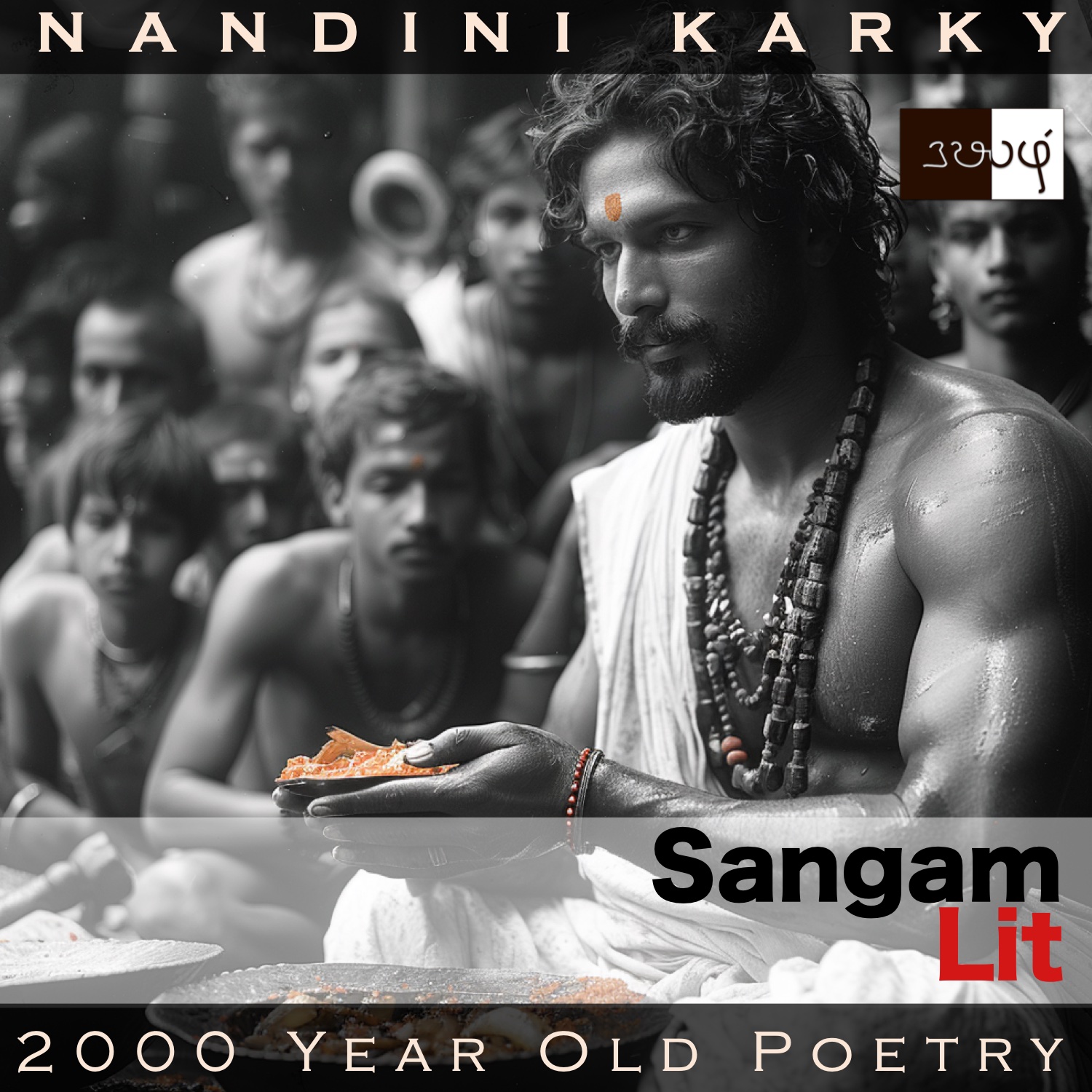Podcast: Play in new window | Download
Subscribe: Apple Podcasts | Spotify | Amazon Music | Android | iHeartRadio | TuneIn | RSS | More
In this episode, we listen to impressive words of praise about a lord of a minor domain, as depicted in Sangam Literary work, Puranaanooru 388, penned about the Leader Pannan by the poet Madurai Alakkar Gnaalalaar Makanaar Mallanaar. Set in the category of ‘Paadaan Thinai’ or ‘Praise’, the verse talks about a poet’s determination to spread the fame of this ruler.

வெள்ளி தென் புலத்து உறைய, விளை வயல்,
பள்ளம் வாடிய பயன் இல் காலை,
இரும் பறைக் கிணைமகன் சென்றவன், பெரும் பெயர்
சிறுகுடி கிழான் பண்ணன் பொருந்தித்
தன் நிலை அறியுநனாக, அந் நிலை
இடுக்கண் இரியல் போக, உடைய
கொடுத்தோன் எந்தை, கொடை மேந் தோன்றல்,
நுண்ணூல் தடக்கையின் நா மருப்பாக,
வெல்லும் வாய்மொழிப் புல்லுடை விளை நிலம்
பெயர்க்கும் பண்ணற் கேட்டிரோ…
வினைப் பகடு ஏற்ற மேழி கிணைத் தொடா,
நாள்தொறும் பாடேன்ஆயின், ஆனா
மணி கிளர் முன்றில் தென்னவன் மருகன்,
பிணி முரசு இரங்கும் பீடு கெழு தானை
அண்ணல் யானை வழுதி,
கண்மாறிலியர் என் பெருங் கிளைப் புரவே!
An interesting description of a poet hides in this verse! The poet’s words can be translated as follows:
“As Venus stood frozen in the south and the yielding fields and rich water resources dried up, on a barren morning, a drummer went playing on his huge ‘parai’ to the gates of Pannan, the famous lord of a small hamlet, and declared his impoverished state. Immediately, making the suffering and angst of that drummer vanish away, my lord, the generous scion, rendered whatever he had. With knowledge gleaned from intricate books as the trunk, their tongues as the tusk, are the poets who always speak elephant-like victorious words of honesty. To them, he grants fertile fields many. Hear of these acts of Pannan! I shall sing praises about his worthy bulls and ingenious water lifts, beating my Kinai drum, every single day. If I don’t do this, let the heir of the southern emperor, in whose courtyard, a bell of justice hangs, and a well-tied drum resounds, the one who has a proud army, and a battalion of esteemed elephants, Vazhuthi, forget to grace and render his protection to my huge band of kith and kin!”
Let’s explore the nuances here. The poet starts by talking about the signs of the skies, focusing on their favourite Venus and says this celestial body seemed to stand for long in the south, and as a consequence, the lands once fertile and ponds brimming with water, dried up. On such a lifeless morning, a drummer seems to have gone to the gates of this leader, who exerted his rule over a small hamlet. Though his domain was small, his name was famous throughout the ancient world, says this poet. This we have witnessed for ourselves, in Puranaanooru 173, when the great Chozha King Killivalavan himself sings the praises of this generous leader. As fitting his name and fame, the leader seems to have generously given all that he had to that drummer, ending his poverty.
The poet continues by adding that this is no isolated event, for the leader is known to give lands with fertile fields to poets, whom he then depicts with an intriguing metaphor. He equates the knowledge the poets have gained from books as their trunk and their tongue as their tusk, signifying the elephantine qualities of the words they render with truth and victory. To express it in another way, the poet talks about how the words of his people(the poets), portrayed as the elephant here, contain both the knowledge of the past, represented by the trunk, and their own creative expertise that flows from their tongue, symbolised as the tusk. A perfect blend of the abstract and tangible to etch the characteristics of a Sangam poet!
Returning, we find the poet saying he will always sing about the greatness of Pannan, mentioning his sturdy oxen and his water lifts that render fertility to the fields in his land. And if at all, he forgets to sing about the greatness of this leader, then let the curse of being forgotten and ignored by the Pandya emperor Vazhuthi befall on his kin, concludes the poet with conviction. And, from this line, we understand that the poet was dependant on the graces of the Pandya king, and yet, he glorifies this leader from a minor region. This stands testimony to the fact that in the Sangam era, the extent of power and wealth mattered not, only what they did with what they had!




Share your thoughts...